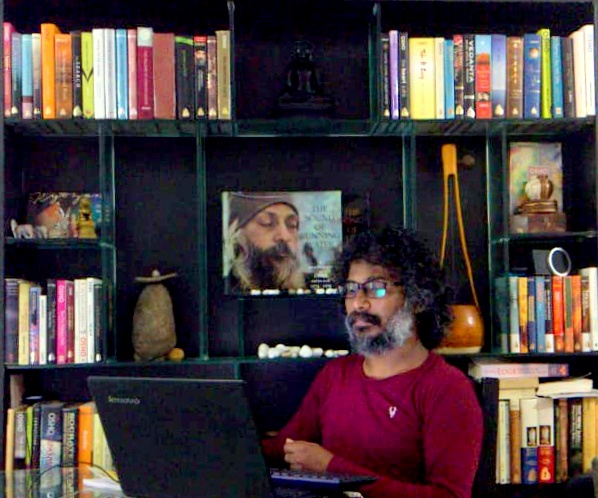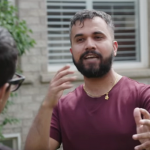Tarpan’s way of reading Osho’s books, how it changed over the years, and finally finding ‘his question’.

When I started reading Osho in 1996, I did not absorb the entire text. I clearly distinguished the discourses as per a) sutras and parables from scriptures such as the Dhammapada, the Upanishads or the Bible, b) Osho’s comments and c) questions from disciples and his answers.
At first I only read Osho’s talks and left out the sutras, giving them sometimes only a second glimpse whilst I almost always skipped the entire question-and-answer discourses.
After many months, I started reading not only Osho’s words, but also the excerpts or sutras, but still left out all question-and-answer discourses. And then didn’t bother reading the questions but only Osho’s answers. “Why waste time?” I was thinking, “All these questions, ultimately, are just coming from ‘ordinary’ people. Only the answers are from an enlightened master, and therefore worth reading.” I read Osho’s books in this manner for about one or two years.
Then I started reading also the questions. Reading Osho’s answer after reading the question definitely made the experience more precious. Slowly slowly, I found myself enjoying the questions too, as much as Osho’s answer. I could see that each and every question asked to Osho was absolutely relevant also to me, especially those that are directly connected with meditation, the hurdles and confusion on the path. Like all Osho lovers, I too had felt many times that “Oh! This is my question and this is the answer I need to hear this very moment!”
My way of reading Osho’s books changed again: whenever I received a book by Osho, I started to first take a ‘quick glimpse’ at all the questions, in all the chapters. Real reading would be done later on. Rather than being only a member of the audience, listening to Osho from the corner of a crowded hall, I felt that while reading the questions I was connecting to the person asking the question, and to the moment the question had emerged in them. It helped me to come closer to Osho and receive his words as an enlightening response. Perhaps this is the ‘magic of being present’ or ‘the rebelliousness of being spontaneous’ as Osho keeps tempting us into.
Now it feels to me that the way I used to read earlier was like reading some document from a far-away past. But the way I read now is as alive as any situation could be. I understand that all these questions and answers have played a very important role in bringing me to this juicy ‘now’.
Going through the thousands of questions Osho was asked, I can see that they were far more truthful, sharp, sincere, intelligent, rebellious and enlightening than any answer given by the so-called masters. And I am not even comparing those to Osho’s answers.
My love affair with questions spurred me to make a compilation of all the questions Osho was asked, including the links to each of Osho’s answers. It’s a simple copy-and-paste game I am playing with on the laptop for my personal use. (Here thanks to Swami Anand Utsav for his encouragement and help.) I thought that just taking ‘an easy walk’ among the questions would be an amazing journey; to experience the unbelievable range of the phenomenon called mind and endless spectrum of issues one would be tempted to know about – and then, of course, read Osho’s answers.
I selected the books in alphabetical order and thought of collecting the questions under different subjects so that picking out a question would be easier. Up until now I have compiled the questions of about fifty books. When I counted the questions on each subject I was astonished by the amount of questions that were about Osho as a person. Another most popular subject was ‘questions’ – the art of questioning, the mind games behind a question. Comparatively fewer questions were asked about awareness, meditations, witnessing, although Osho then introduced those subjects in most answers. We would have thought that most questions were about seeker’s dilemmas, about relationships, love, and sex too! But there is definitely a chance for different trends in other series of talks I still have to go through.
All these years, whenever I was going through the questions, there was another thing I was quite curious to know about: What would be my own question? Many times I thought, if I had been given the chance to meet Osho and allowed to ask a question, what would I have asked?
In truth, there is nothing left to ask, simply because whatever could be asked has already been asked by others, on my behalf so to say. And whatever answer I need to hear is given the moment I need it.
Still, I would have asked Osho one question. But all these years I didn’t come across it; nobody has asked my question. It is hard to believe that nobody has gone through the same urge or feeling. But my compilation work gifted it to me. Yes, the same and only question I would have asked, has indeed been asked. Here it is:
The last question, and very important:
You are so sweet and rare that I feel like kidnapping you before I leave Poona. What do you say?
I surrender.
I don’t know who asked this question, but all my cheers to them. I am sure that even if it had never been asked, it was everybody’s question. Perhaps, even without asking his permission, everybody has kidnapped Osho into their heart. And perhaps, even before being kidnapped, Osho went into everybody, hiding in everybody’s heart
Osho, you are so mischievous!
After falling in love with your sweetness and uniqueness, we thought life would be easier, no troubles, no responsibilities…
And when we heard you say, ‘Accept yourself,’ we dreamt of a lazy man’s heaven.
Only we came to understand that it’s a one-way walk on a razor’s edge!
And your invitation to take the risk is so enchanting!
Our sleep is definitely disturbed!
Dhyan Tarpan was born in Kerala, India. He lived many years in Mumbai, working in construction/electrical engineering, and took sannyas in 2000 at the Osho International Meditation Resort in Pune. Along with writing articles and travelogues in the Malayalam language, he has translated from English seven of Osho’s books. Tarpan recently shifted back to Kerala where he is fully involved in writing, playing/making music and related activities. His blog, Osho Wings Osho Waves: dhyantarpan.blogspot.com
Quote from: Osho, Come Follow To You, Vol 3, Ch 4, Q 5 Chapter #4
Chapter title: Surrender is the door to bliss, to beauty – 14 December 1975 am in Buddha Hall




Comments are closed.